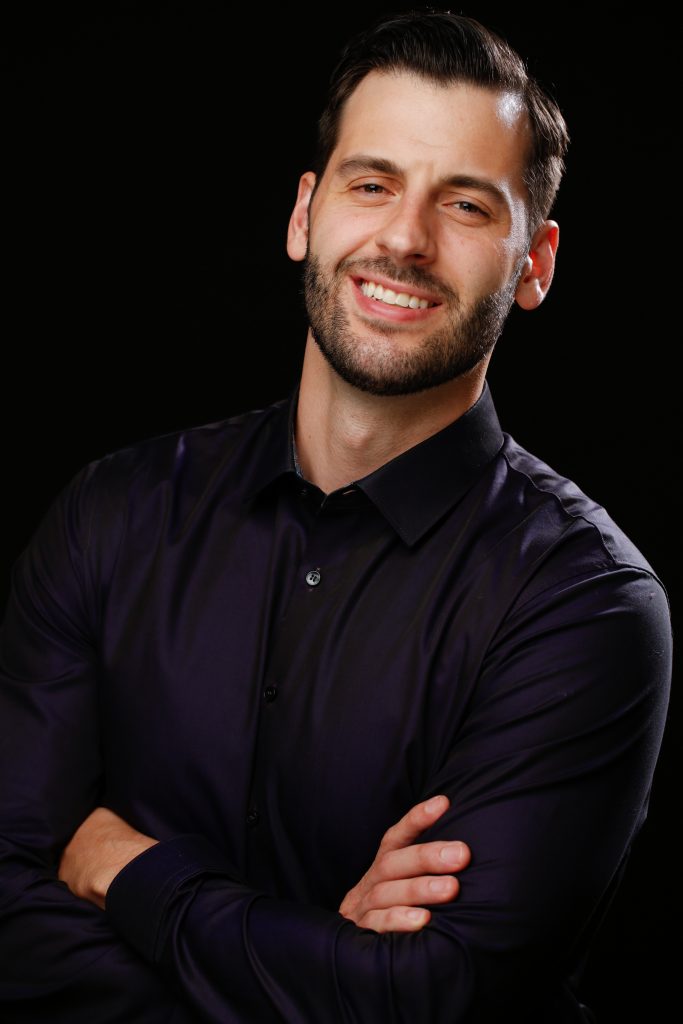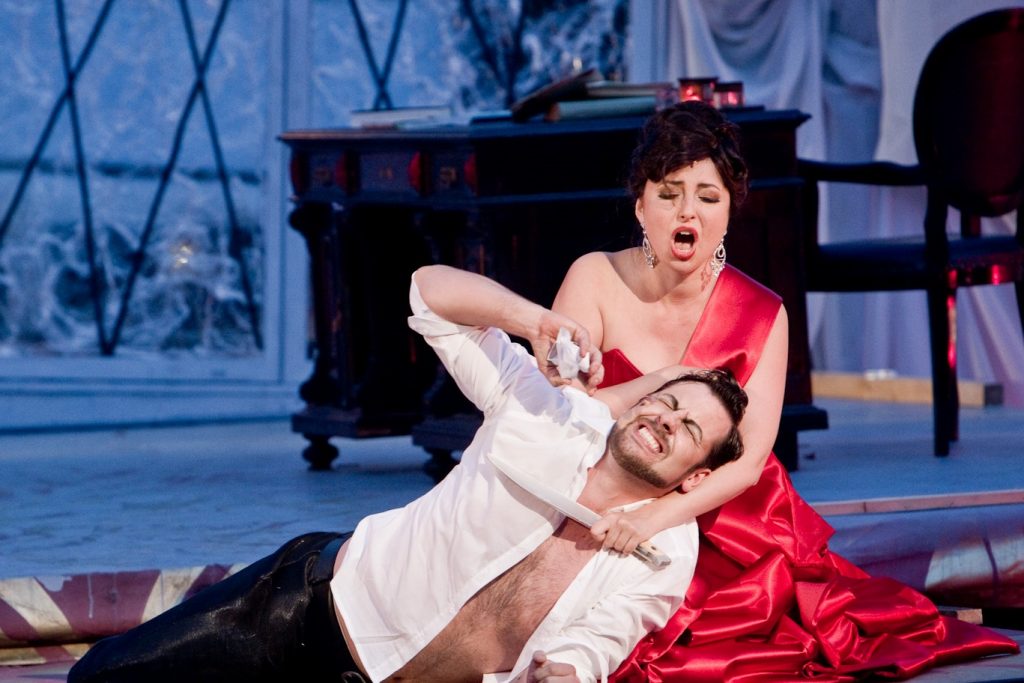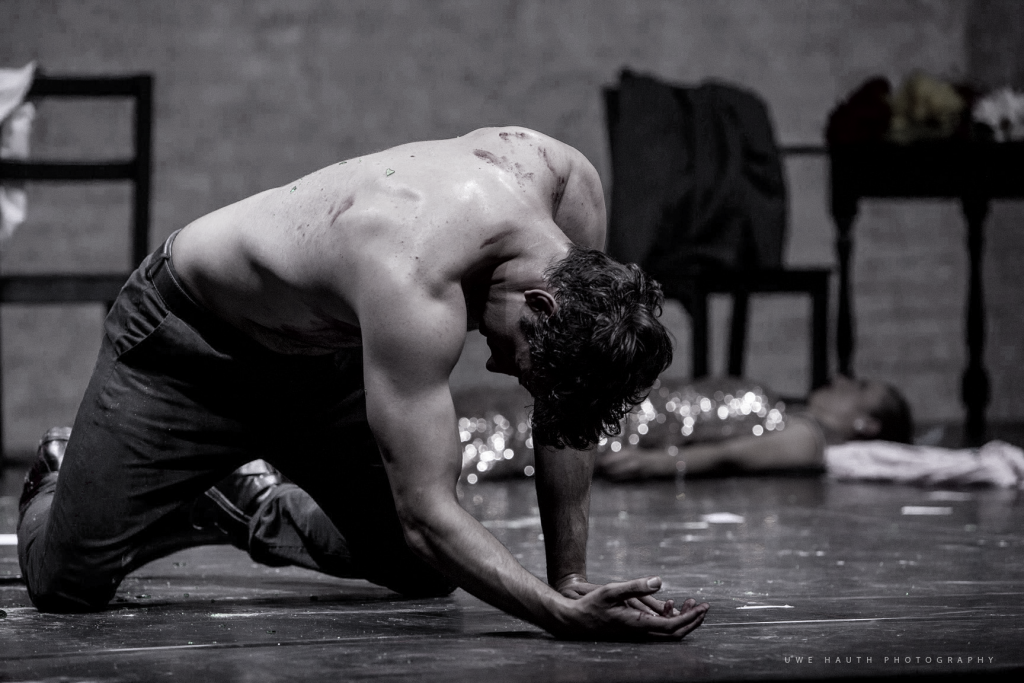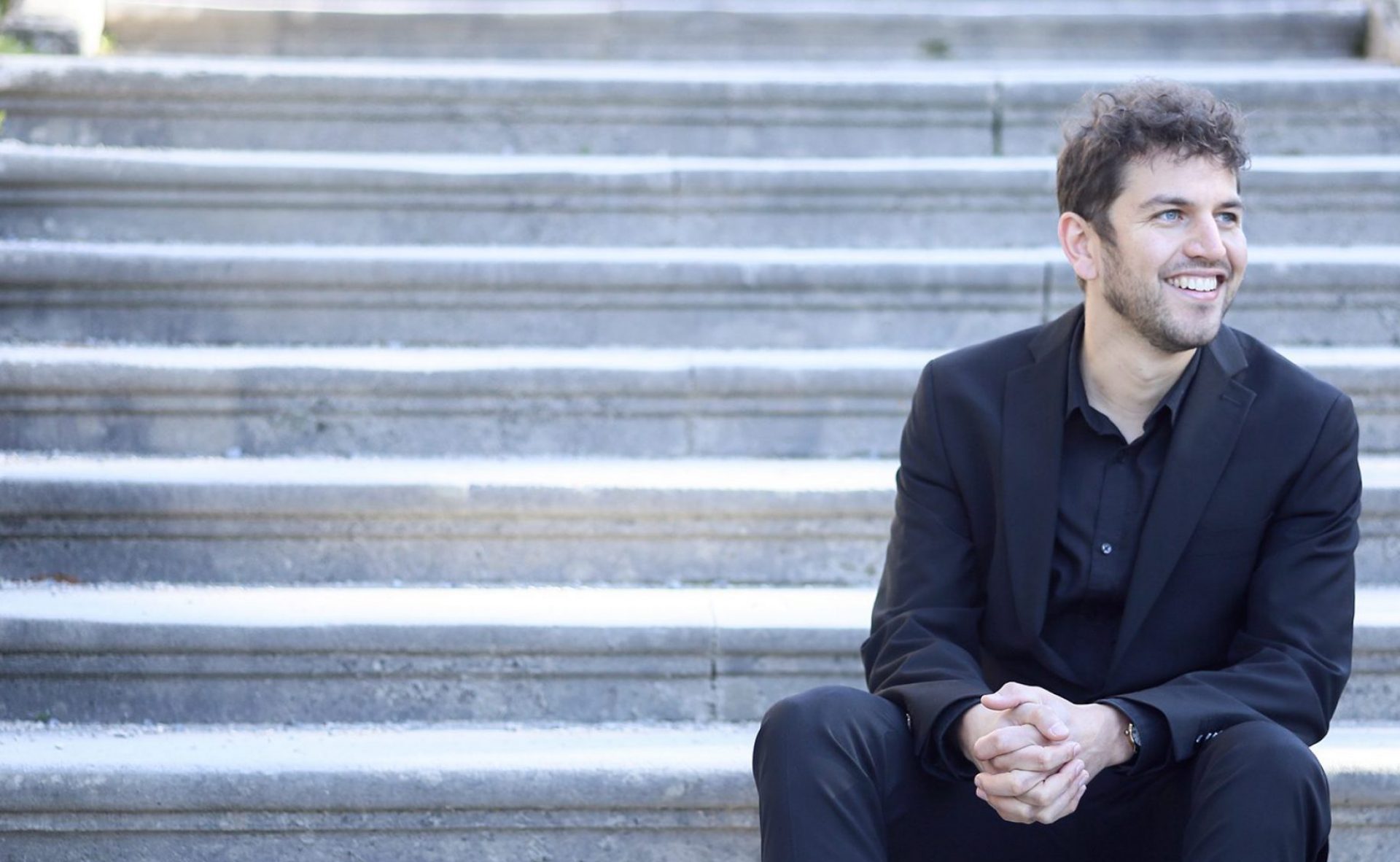Jared Ice is an American baritone, who worked for many opera houses in the US before moving to Germany, where he now has an active freelance singing career. He is also the founder and co-host of the popular podcast `Sex, Drugs and Opera´.
You can find the German version of this interview here.

Opera should always be serious, just how Hollywood films are serious. But there should always be an aspect of it that should be allowed to be ridiculous.
D: Ok, we’re going to start with a quick-fire round of questions. Give me a song that would get you on the dance floor.
J: Oh man, that’s gonna be anything by The Killers. Mr Brightside.
D: Your favourite instrument?
J: The piano or tuba. For years I played tuba.
D: Favourite opera?
J: Tosca. There’s no dead time, it just goes. Act 3 gets a bit slow, but especially Act 2 is just plot, plot, plot. Three characters and it has all the stuff that opera needs: intrigue, drama, love, violence, it’s just packed.
D: Favourite production of an opera that you’ve seen?
J: It was a long time ago, but I saw The Flying Dutchman in Seattle, and Greer Grimsley was the bass baritone. It was just a huge ship on the stage, and they’d built it so that the stage came outwards, It was just incredible with the spectacle with the music and Grimsley just being the stud that he is!
D: Do you have a favourite production you were in?
J: Honestly it’s not an opera, but when I was in South Carolina, we did a musical called Das Barbecu. It was commissioned in Seattle and it’s the story of Wagner’s Ring but told as a country western style musical, so we all wore cowboy hats and I was Siegfried the cowboy. It was meant to be an outreach thing. It was just fun to do and people loved it; a fun show.
D: Favourite classical composer?
J: I would say Verdi. I can’t separate myself too much from who the people were, and I respect a lot of things about Verdi’s life, because that gets into the music and once you know it, you can’t unhear it. But the guy could just do it, he was able to catch moods in seconds, and when you look at it, it looks simple on the page, but when you hear it, it’s effective. There’s not a lot of fat on Verdi, and there’s a lot of subtlety.
D: Most importantly, describe your Hot Toddy in three words!
J: I’m gonna take another sip. Light! You know, I could drink that during the summer. Smooth. And I don’t wanna say warm, so I’m gonna say cosy! Smooth, light and cosy.
I never would have been happy with a ‘what if’ in my life, and Europe for a lot of musicians is the big ‘what if’. I wasn’t gonna do that – I couldn’t leave that stone unturned.

D: You’ve been living in Germany close to eight years now. Why originally did you move here?
J: I had finished my artist diploma and I was singing in the Northeast of the States, and I had nowhere to go. People had always talked about how Germany’s the place to go for opera and I never had any fear of going places.
D: Had you travelled much internationally before that?
J: No. I just had an opportunity. I had sung for an agent in New York and she said ‘Get some European experience. Go out there for two or three years, come back and let’s hit the New York scene.’ And I came, and then I just stayed, even though it was supposed to be temporary. I wanted to come and see it because everyone had talked about it like it was this magical place, but nobody was going there. I need to see things myself, so I went, and I liked it. I never would have been happy with a ‘what if’ in my life, and Europe for a lot of musicians is the big ‘what if’. I wasn’t gonna do that – I couldn’t leave that stone unturned.
D: So, it was more a general idea of the place than a specific reason?
J: I didn’t have a job; I didn’t have anything lined up. I just had an opening and some cash. I just wanted to do it and see.
D: Now you know the German and American opera scenes very well. What could the American scene learn from the German scene?
J: There’s definitely a strength sometimes in doing more smaller level performances. In America, the theatres are nearly all for 3,000 people and either you have these huge productions or there’s a piano in a bar, where you wear your own costumes. There was no middle. Also, in Germany their not afraid to try something. There’s this support from the government so your money’s safe and I think that’s where it comes from. German houses aren’t afraid to do something new with something old or to do a new piece, and America is a lot more about pleasing donors and the public, which might be because that’s where the money comes from. So, if there was a way to make it more authentic than pandering, that would be a strength.
D: Do you get the sense that German audiences are more interested in ‘out-there’ pieces or productions?
J: They’re open to it, to take it in. I think in America these things are happening but the new works in America often have to have some sort of social message attached to them, when in Germany it’s more new works based on a book for example. I think a lot of things in America, artistic and political, come from funding, and if you want a chance of getting your work out there, you have to find a group that’s going to invest in it. I think American thinking is also collective, where people think ‘what does this belong to’ for example, and German thinking is not so much like that.
D: What would you say to a young American singer thinking of moving to Europe?
J: Have a path, have a target, have a goal, but the more open you can be to the different ways a career can happen, then the more likely it’s going to happen, and the more likely you’ll be happy doing it. A lot of singers come over here and think ‘I need a young artist programme, I need a Fest position in this Fach’ and the more you can think, ‘maybe chorus, maybe some musical stuff, maybe make my own project’, you’ll find your way, and you’ll always be surprised how something that seems unrelated can lead you back to where you want to be.
D: I wanted to touch on Fest1 positions versus being completely freelance. Do you think one is better than another, and what’s your experience of them?
J: I’ve worked mainly as a Guest in theatres over the last eight years. I had one experience where I was Fest and there’s pros and cons. With the cancellations over the Coronavirus now, it’s obviously a much better time to be Fest. I lost three shows this month, and that’s quite a lot of money to lose on four days’ notice. There’s the money aspect of things, the health insurance side of things, and a lot of it is just your life and who you are as a person. I’ve always enjoyed guesting because I’m a project kind of guy, but I could imagine if I had a family, I would have to fill my time with being with them, so being Fest might be easier. It’s more a matter of being open to both and seeing how your life fits.
D: Do you think there’s an artistic difference between the two?
J: Yes. I find with Festing you’re often overloaded. You’re doing so much that you can’t really dig into anything. You have lots of shows, so you build consistency and strength, and just by doing the shows you’ll find the shades and colours, but it’s often not as meditative as guesting lets you be, where you live with the piece for seven or eight months and have your own time to build the piece.
D: Do you find it hard to discipline yourself when you do have time off?
J: I find it easy because I’ve found what works for me, but it’s definitely harder because you have to manage your time and get it ready for day one [of rehearsals]. That’s always a challenge. You have to be honest with your strengths and weaknesses and find what works for you.

D: What are the biggest challenges of working as an opera singer in Germany?
J: I think it’s like any job, where if you’re, say, a police officer you don’t realise how much paperwork you’re doing. I think if you can act and sing you’ll have a career; I’ve seen very few people whose careers end because they can’t act or sing well enough. The life of a musician is the hardest part. The realities of being an artist and having your livelihood coming from something that takes so much emotional energy and time only gets harder as you go on in life. You might have a family and kids, or in general there is a higher physical toll – I’m 32 and I just feel that it’s harder to do a show until 11pm and get up the next day for rehearsal these days.
It’s not an easy way to make a living. Also, just the life; when I was younger and in a rock band it was really cool to be a musician, and I think a lot of musicians are dreamers – they want something bigger. But once you get into your 30’s, your friends will get married, get jobs as bankers or consultants, buy houses, cars, or find investing opportunities, and you’re still kind of just singing. I think it gets tough to find your path. If you have a family, you can miss a lot of things, or often you’re just leaving your partner alone to watch Netflix every night. You’re working Saturdays, Sundays and you reach a point where you realise that’s not temporary. You don’t get five days and then a weekend, and that wears on people. Another challenge is knowing when to say no. That’s a hard thing to learn and I’ve felt myself struggling with that.
D: So what’s the other side to that, why do you keep doing it?
J: I have tried to give up a few times and I just can’t! I would rather do this and have fewer of those other more materialistic things, and it’s my life. I started doing it when I was five, and I have to do it. So for me it’s not so much of a choice, and it’s rewarding. When it’s hard, it’s hard, and when it’s rewarding, it’s extremely rewarding. And that spectrum is why I do it, because with most jobs the reward is at 20 per cent, and the hard is at negative 20. For us it’s like 100-100.
D: I absolutely agree. Personally, I only need to have one of those very rewarding moments maybe every month, and it pays off the rest of the bad stuff.
J: Yeah. And I like to have ownership over what I’ve created. I own what I’ve done as a singer whereas when you work for a company you can become a pixel on a TV screen. I’ve never been able to deal with that very well.
The Magic Flute is downright dirty and ridiculous sometimes…if you look at Mozart’s Cosi Fan Tutte or some Donizetti operas, they’re like sitcoms, just missing a laugh track.
D: Let’s talk about the podcast. Along with tenor Michael Pegher, you run the really popular podcast ‘Sex, Drugs and Opera’. Why did you start it?
J: I started it because I remember way back in Seattle, when I was a young singer of 20 or 21, the director at the opera house, Speight Jenkins, was giving this talk, and he said ‘one of the most tragic things is that some of the best voices in the world will never be heard, because they give up too early’. Especially if you’re a dramatic voice, you have to wait until you’re 35 to start, for a lot of people. What do you do until you’re 35? I sang my first Scarpia [in Puccini’s Tosca] when I was 26 which is way too young, and that was twelve shows with a full orchestra. After that I got asked to do Count Walter in Luisa Miller in Germany, which is a big Verdi role. I was then getting asked to do bigger and bigger stuff earlier and earlier. I struggled, as mentioned earlier, with saying no, and my voice was beginning to change in a bad way. I thought, I’ve got to fill my time with something that’s creative and operatic, and I was 29 when I started the podcast.
I also didn’t hear people talking about opera in the way I was at that time. Me and my friend group were talking about opera without any sort of posture, where we could just say ‘that was fucking great’, and that voice wasn’t out there. I felt like it was important that it existed, however small or big it was.
D: Would you say it was a reaction to how opera can sometimes be too serious?
J: Yeah. Opera should always be serious, just how Hollywood films are serious. But there should always be an aspect of it that should be allowed to be ridiculous. The Magic Flute is ridiculous sometimes, and people enjoy it. And there’s commentary in Verdi about political figures, and now it has to be done in such a noble way. You can make a raunchy college film, a Will Ferrell movie, of an opera, you can do it. The Magic Flute is downright dirty and ridiculous sometimes!
D: Tell us about the mini operas that you compose and produce as part of the podcast. I think they’re really pioneering.
J: Everyone is doing such serious things now, but if you look at Mozart’s Cosi Fan Tutte or some Donizetti operas, they’re like sitcoms, just missing a laugh track. I felt that nobody was writing stupid stuff that was orchestral and sung classically, but still silly, topical and relevant. I wanted to do that too, and all those things combined led me to create the mini operas as a platform for my creative impulses, wanting to get the voice out there, but also wanting to fill my time with a creative project where I could have control over how I was using my voice.
Our goal is to always have the English to be as close to how we talk, so we don’t use singers’ diction because we want it to be relatable. I think one of the most distancing things about an opera piece for someone who doesn’t listen to it is that immediately the way they’re singing has nothing to do with how we talk, this over-crispness of the language. The words we use also rarely rhyme, unless it’s to make a joke, and they’re supposed to be content for social media. An Instagram post is sixty seconds, so they are all fifty-nine seconds or less because that is the platform we want it to fit on in one take. They’re meant to be operatic memes; you’re supposed to immediately understand what it is. There’s no hierarchy.

D: And when you compose the music, is the story important for you?
J: The story is everything! I want to create a mood: is this funny, scary, sarcastic? And then I want the storytelling to happen. I want the operatic voice to be used, but then I want it to have room to function as it needs to. Sometimes the operatic voice needs precision or room, and so I try to give it a lot of room. I guess my style is either precision or dirty freedom, with not a lot in the middle!
D: Returning to you as a performer, what do you look for in a conductor?
J: Oh that’s an interesting question! In a conductor, I don’t like so much right and wrong, but more finding what works. The best conductors I’ve worked with will ask for something and when I say ‘I can do that, but it’s not really working well’, they’ll immediately say ‘let’s try something else.’ The conductors I like working with the most don’t push their idea; they’re open to collaborate. They’ll push you to do something if they know you can do it, but they’re not going to force you into a box, so if you’re a low voice man and you don’t have a good float, they’re not going to force you to do it. Instead they’ll find something that will communicate to the audience more, because the audience doesn’t know what it should be most of the time. Most of them are just going to get a sense of what’s happening in the story.
The best conductors’ decisions are either emotionally based or musically based. They might say ‘your rhythm has to be right here because we really need this to dance. It has to dance here because we need that lightness to it, otherwise it’s not funny.’ It is best when they want a good show that affects people as the outcome and not a museum piece. Not like Guitar Hero – ‘how many notes did you get right’, but ‘did it affect you?’
D: What about directors? What do you look for there?
J: A similar answer, I think. I don’t like it when a director comes in and has their thing and you just have to be a pawn and do it, but I also don’t like it when a director says ‘show me what you have in mind’.
D: So somewhere in the middle?
J: Yeah, something about a collaboration. I want them to come in and fill my gaps because I have to act and have artistic impulses as an actor, but I can’t see myself, and I often don’t know the history of the piece as well as they do. They need to fill my gaps and recognise my strengths, using what they have to tell the story instead of what they wish they had. So, in Germany, a big part of that is when I speak German, I have an American accent. It just is like that. As a director, you can either get pissed off and wish that I was a German guy, or you can make my character international, which is one word! You can have another character saying ‘are you back from America already?’ Something like that. Or don’t force the dialect on me. I want someone who is knowledgeable and collaborative.
D: Finally, what’s the future of opera? In a hundred years is it still going to be like it is today?
J: It’s hard to know. I think music in general is going to become very digital and even interactive. I think the future of movies, music and CGI is that you’ll sit down at a Smart TV and say ‘I want to see an action horror movie with Bruce Willis at the age he was in 1995, with music like Hans Zimmer,’ and then it’ll write you a movie and music. And that sounds really sci-fi but if you look into the deep fakes and the music that computers are writing at the moment, it’s very possible that that will be the new normal. If that’s the world, what’s opera’s place in that world?
I think if opera still exists in 100 years people will return to it, because it has something that has made it last for as long as it has. I don’t think opera has to change too much. It has to be flexible, digital and go with trends, but opera either needs to become something else or just open up and let people in. I don’t think the problem with opera has ever been itself, it’s just been excluding people from it. People not knowing what it is and where to go.
Verdi used to talk about this ‘Golden Thread’ in opera, and whatever that ineffable thing is, it has to keep doing that. It has to either become something new, which you may not recognise as opera, or it has to learn to be proud of what it is and quit trying to be a Marvel movie and ‘cool’. These Met broadcasts in movie theatres are a good direction. What we are doing in the podcasts is a good direction. I think people buy into authenticity, and opera being proud and true to what it is, is the only chance it has. That’s what its future is.
Thanks very much to baritone Jared Ice for his time, and to you for reading! Let me know if you have any suggestions for future interviews, or if there’s a particular topic you’d like to see covered.
You can check out Jared’s podcast ‘Sex, Drugs and Opera’ on all good podcasting platforms, and follow this link to see his latest mini opera with his co-host Michael Pegher, including a silent role by another familiar face!
Notes and Links
1) ‘Festing’ means being a full-time salaried opera singer in a theatre. Such positions are usually only available in Germany, Austria and Switzerland. They are in contrast to ‘Guest’ positions, where the singer will be contracted to sing for one production, which encompasses the rehearsal period and following shows.
You can learn more about Jared from his personal website, and find out how to follow Sex, Drugs and Opera, at this link.
